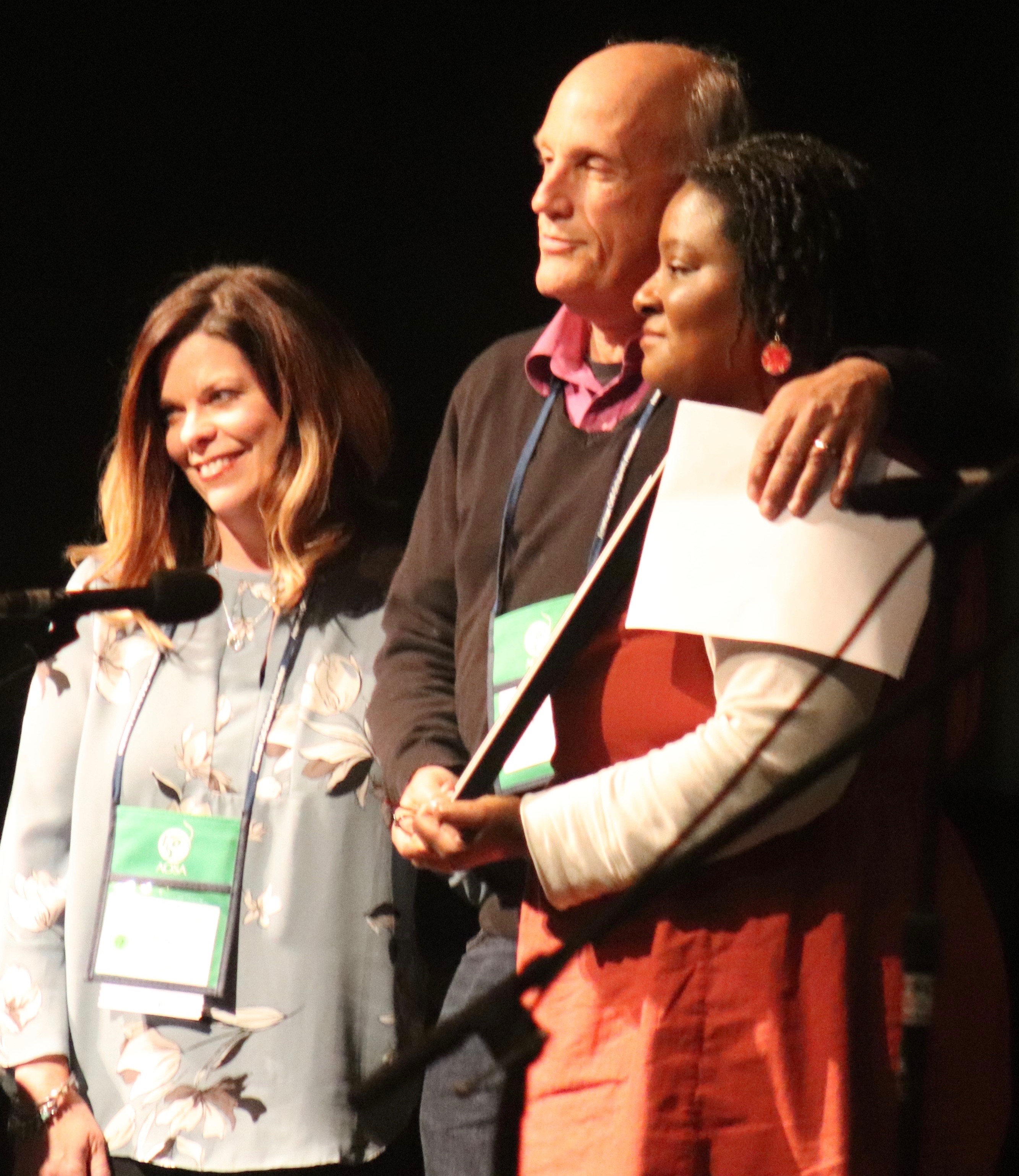 “Our greatest endeavor must be to make ourselves irreplaceable.” -Miguel De Unamuno.
“Our greatest endeavor must be to make ourselves irreplaceable.” -Miguel De Unamuno.
To make ourselves irreplaceable – that was Avon’s work and he did it masterfully. So began the tribute to Avon Gillespie, recipient of the 2017 AOSA Distinguished Service Award by Doug Goodkin. The award was given posthumously to Avon Gillespie, and accepted at the National Conference in Fort Worth by his daughter, Robin Gillespie.
Avon was born in 1938 and received his B.A. at Indiana State University. He held a Master Certificate in Orff-Schulwerk from the University of Toronto and Memphis State University. He served on the music faculties of several universities and was invited to teach at the Orff Institute in Salzburg, Austria. Avon researched Black Music with Bessie Jones of the Georgia Sea Island Singers and worked with Shirley Mordive of Columbia College, Illinois. Avon loved composing and presenting lectures. He was an active workshop presenter at numerous colleges, local Orff chapters, and both state and national education conventions. His untimely death on May 29, 1989, prevented him from contributing more to the North American body of Orff Schulwerk literature.
At the conference, Doug Goodkin’s tribute continued. “There’s only a handful of people who have carried this work forward and put such a forceful stamp of their character on it that they left a gap that was unfillable. And Avon was one of them. How do I know? Because 28 years later, I still feel a hole where he used to be. I still feel tears rise up when I invoke this man who changed my life—and many lives— so profoundly and irrevocably. We are all irreplaceable, but few of us live our genius deeply enough to leave such a lasting absence. Through the combination of his beautiful singing voice, his expressive movement and his imaginative ways to create a joyful community experience, he brought the ideas and the ideals of Orff Schulwerk to new and far-reaching places and touched all who had the good fortune to work with him. He was one of the few early African-American Orff teachers and had the capacity to not only raise the roof with the collective spirit of black music, dance and games, but equally to hush the room with a beautiful German canon or evocative Gregorian Chant. He embodied the spirit of play, the constant inquiry of what he called “possibility teaching” and the elemental close-to-the-earth quality of what he called “the barefoot connection.”
In Avon’s own words: “In Orff Schulwerk nothing is ever finished. We are not involved in mere problem solving, but in possibility seeking. What we are starting to see is more and more safe teaching, teachers afraid of taking the risks that real process demands, teachers looking for an unchanging curriculum, for recipes and information rather than experiences and discovery. In curriculum we have a prescription, but the lifelong work of Orff Schulwerk must be built on the roots of wonder.”
It is our great loss that we didn’t have a few more decades of Avon to remind us about what is truly important in this work, about keeping alive the roots of wonder. But we are blessed to have had him. But of course, he’s still here. In the African tradition, the ancestors are not people from the past, but those
who passed over and are still present wherever community gathers to dance, sing and create. So here we all are and here is his daughter and isn’t this a fine thing, to remember the man and to remember his message and to renew our vows to keep spirit and soul in our teaching.
In a session during the conference, “Remembering Avon Gillespie,” Judith Thomas remembered him with these words. “Avon drew from a huge pallet of nuance in his teaching …he seamlessly wove movement and mime, echo, song, silence, body percussion, laughter, love, and trust into his work. But above all, he called on that place where according to Sir Kenneth Richardson, we ‘leave the cities of our comfort to wander in the wilderness of our intuition.’ So important was the “intuitive moment” to Avon, that preparing a map ahead of time (as in lesson plan) was painful, if not impossible, because of how his mind worked as he made his magic.
Remembering Avon with this award inspires all of us to continue the legacy of the Schulwerk. As Judith Thomas put it in remembering Avon’s teaching, “rather than teaching safely, one felt Avon taught on the edge of disaster and with great passion. He was a risky teacher who trusted his own instincts and those of his students.
Poem for Avon by Judith Thomas 1989
AVON GILLESPIE
was a velvety man
who, when he used words
took them and
infused them with air;
coerced them into fullness
and meaning, round and
resonate, punched them
from their undersides and
kept them aloft for all to ponder.
AVON GILLESPIE
was a man of motion
turning line to liquid,
space into whirling eddies and
snatching handfuls of shapes
defining them, showing
the way.
AVON GILLESPIE
was a man of profundity,
who changed humble to holy;
who knew where the heart lay
and how to traverse its labyrinth;
a gentle human who
knew the pain
of too much tenderness.